The Gold of Taupeka Transport
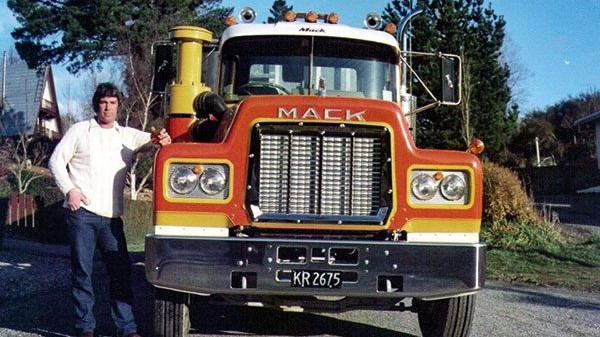
We look back at a man who helped bring us one of the smartest fleets in the South Island, if not New Zealand.
The transport industry sadly lost Nicol Kane back in December 2019 and it was always my plan to catch up with him to talk about Tuapeka Transport. It taught me a valuable lesson: don’t leave these things too long. His passing caught me by surprise, and with that, a lot of history and stories were lost.
Nicol left South Otago High School in Balclutha in 1963 at the age of 15, which seemed to be the magic number back then. He began work at South Otago Transport in Balclutha, where his father worked. General labouring and painting stock crates were part of his grounding in the transport game.
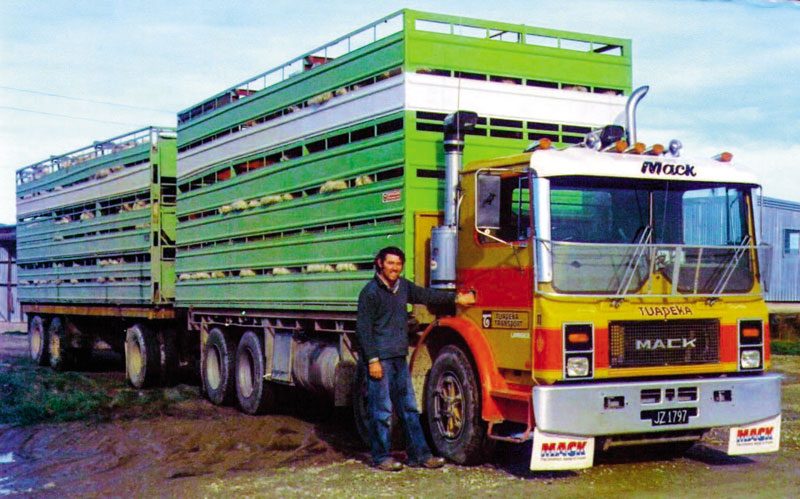
At 16, he got his HT license and was sent over the hill and up SH8 to Waitahuna, where South Otago had a base. The company had bases scattered all over – Balclutha, Lee Stream, Milton, Owaka, Waihola and Waitahuna. There were usually three trucks based at Waitahuna, and Nicol was driving an AEC pulling a semi-trailer on livestock and general cartage. There was plenty of lime out of Browns near Winton and livestock to Bluff and Christchurch. The AEC gave way to a Leyland Mastiff in about 1967.
In 1969, Nicol married his partner, Judy Gold. They had known each other since Judy was 15. Judy worked at Gold’s Bakery in Balclutha, still bearing the same name today. She recalls Nicol working away in the livestock crates, and he would throw out a wolf whistle as she walked past on her way home from the bakery. The lads at South Otago used to send Nicol on the pie run to the bakery. Judy would chuck in an extra one so Nicol wouldn’t have to pay.
They moved into a transport house in Waitahuna, and Nicol continued to work at South Otago until 1977.
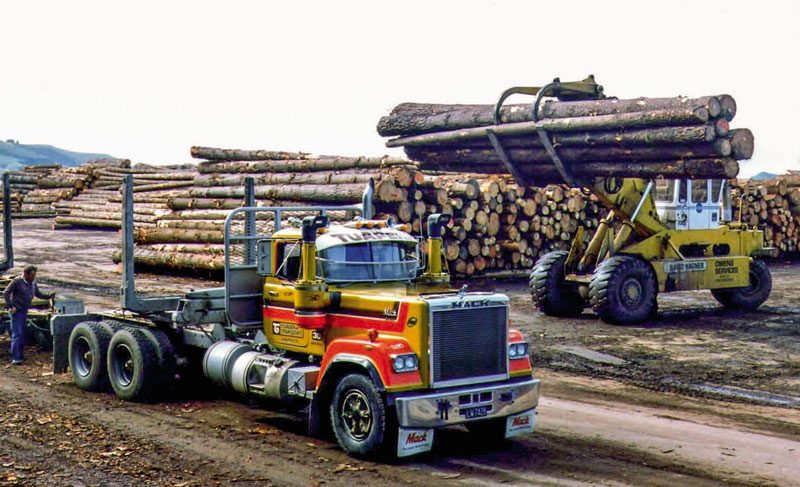
The couple bought their first house in Mosgiel when Nicol picked up a new job working for Farmer’s Aerial selling fertiliser. That only lasted a month before a job came up with Refrigerated Freight Lines (RFL) in Dunedin. Nicol jumped at this chance. Among the RFL fleet were Mercedes-Benz, Fuso and R-model Macks. He went onto one of the Macks for six months, driving up and down the country. They were long days, and Nicol was away from home often. He moved into the office in time, taking on the depot manager’s role.
Nicol remained at RFL for two years and, during that time, his mind was ticking over about the thought of owning his own transport company. There were options and opportunities; Wally Powell in Milton and Somerville’s in Lawrence were two that Judy could recall. Taking the Somerville opportunity, Nicol teamed up with Gordon Soper, who was working for Somerville’s at the time, and in 1979, Tuapeka Transport was born. Nicol and Judy had two daughters, Adele and Jann, and the family all moved to Lawrence at this time.
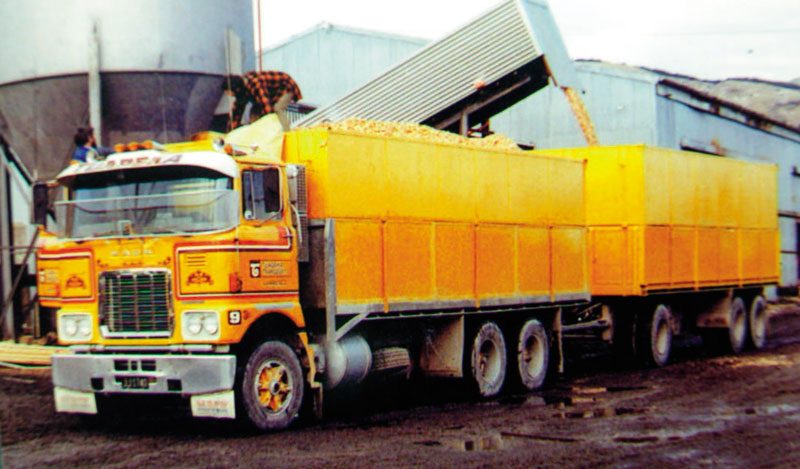
Finance to get into Somerville’s came from UDC, and Nicol stayed loyal to the finance company in his time at Tuapeka. Somerville Transport consisted of about 12 trucks – Nissans, Mercedes-Benz, Albions, Leylands and a Leader among others – with about 10 staff. Nicol was about 30 at this stage, and he and Gordon poured everything into the company. The fleet colours were tweaked, resulting in one of the most instantly recognisable liveries in the country – one that, fortunately, still exists today.
From the outset, it was evident that the current range of trucks lacked power to tackle the hills around the area. Gordon was happy to purchase anything, but Nicol could see the advantage of torque-laden American trucks. His experience with the Macks at RFL saw the first R-model ordered for Tuapeka in 1980. The high horsepower and dependability made for good business sense. Servicing a big rural area with reliability backed this up.

The first R-model was a 320hp unit – build No.417 – from the Motor Truck Distributors (MTD) plant in Palmerston North. Tuapeka stalwart Jock Clucas got the truck new, carting livestock and bulk product. It was the start of a relationship with MTD that lasted until the company was sold off in 2003. The success of the R-model then led to the purchase of an MC model in 1981, build No.494, an eight- wheeler with 320hp on tap. Ray Stronach was assigned this machine.
A first-hand recollection of the benefits of Tuapeka’s high-torque motor policy came as I wrote this story. I remember as a young fella sitting alongside my dad in a West Otago Transport F10 Volvo, heading north out of Dunedin with sheep onboard one frosty morning. The Volvo got stuck on the ice on Pine Hill. The MC was trapped behind the F10. Eventually, the F10 got traction, followed by the MC. I looked back in the mirror and the MC came into view under the Patmos overbridge. It got closer and closer, quickly reeling in the F10 heading up Thompsons Subway on the Northern Motorway. It overtook the F10 and disappeared out of sight.
The third Mack was a tractor unit that Nicol himself drove, and it towed a three- axle self-steer semi-trailer with crates.
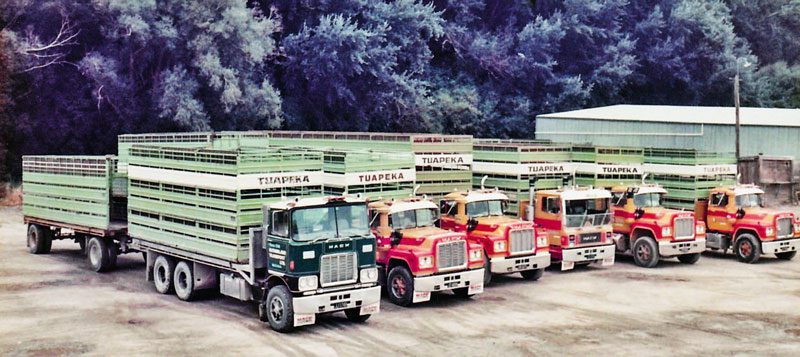
Initially, Gordon was mostly office-bound, and Nicol was out driving, though Nicol eventually moved into the office to help manage and dispatch when the size of the fleet increased due to workload.
The three-deck stock crates on the back of the self-steer certainly challenged the height limitations. One time on a big stock move north, Jock Clucas led the convoy, and to allay fears of the self- steer trailer not making it under the Alma Underpass just south of Oamaru, he got out of his Mack and managed the traffic so Nicol could make it through safely – which he did.
Following the addition of further R-models over the next few years, a 440hp Mack Super-Liner arrived in 1985, build No.792 for MTD. This went onto woodchip cartage with Jock Clucas.
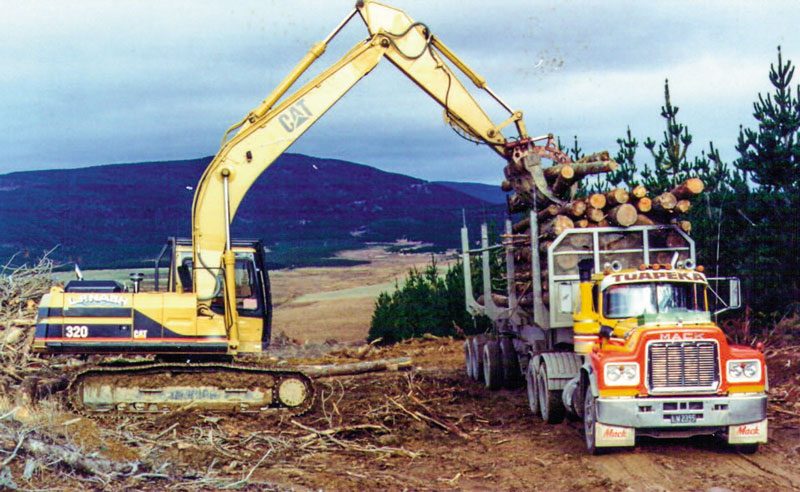
Tuapeka had picked up the work to supply logs and cart away woodchips from the Barrow Box sawmill near Tapanui when it sold its in-house fleet of Nissan logging trucks. Milton Brenssell, an owner-driver for Barrow Box, went onto an R-model carting logs. An R-model, an FR Mack and the Super-Liner all had a go at carting away the woodchips. The Barrow Box mill eventually closed in 1987.
Though not as significant as rural supply, logs became a big part of Tuapeka Transport. The initial set-up of log trucks came via the purchase of two ex-Nelson Pine Forest 2624 Mercedes-Benz log units. The gear was transferred to a couple of Macks, and the two Mercedes-Benz units went onto other work within the company.
With the closure of Barrow Box, Tuapeka began carting export logs for forest owners Wenita to the railhead at Waipahi. The chip bins were removed from the Super- Liner, and it was set up as a logger. Eventually, the Waipahi railhead also ceased operations, and the logs were carted directly to Port Chalmers, near Dunedin.
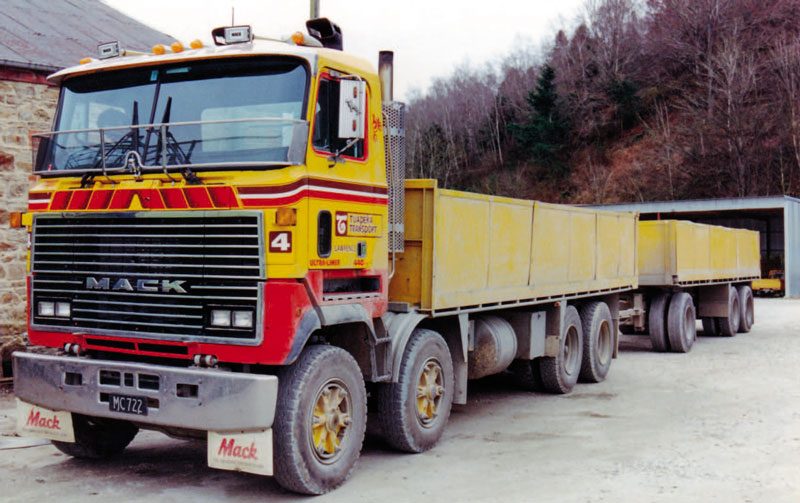
As the logging increased, more trucks came onboard. A second-hand Super-Liner new to Alexandra Transport was set up as a dedicated log unit. Two R-models with trailers were bought from New Zealand Forest Products at Conical Hill near Tapanui for carting logs to that mill, and for a while, Tuapeka ran an ex-Ross Douglas Super-Liner on logs while awaiting a new build.
As the new Macks came onboard, the older trucks disappeared from the fleet. Another 440hp Mack was added next, this time a Cruise-Liner, the last of the model to go on the road in the country. Interestingly, it almost never happened… The search for another eight-wheeler saw Tuapeka order a new Series-2 Scania, but a price blowout sent them back to MTD. This was just before the new Ultra- Liner model was due, and Nicol didn’t really want the Cruise-Liner. As the last of its type, he didn’t particularly want a one-off, nor did he want a sleeper. But there was a degree of desperation to get a new truck on the road, and the Cruise-Liner was available due to a collapsed finance deal. Suffice to say, the Cruise-Liner hit the road in 1986, servicing the rural community with the late Ian Beel driving it.
The Cruise-Liner wasn’t the only big cabover Mack in the company. As touched on above, there was also an FR Mack, bought second-hand from Sutherland Transport in Waikaka with less than 100,000km on the odometer.
Gordon had high praise for it. “It was a great buy. It did everything for us. Stock, woodchips, logs, bulk and freight.”
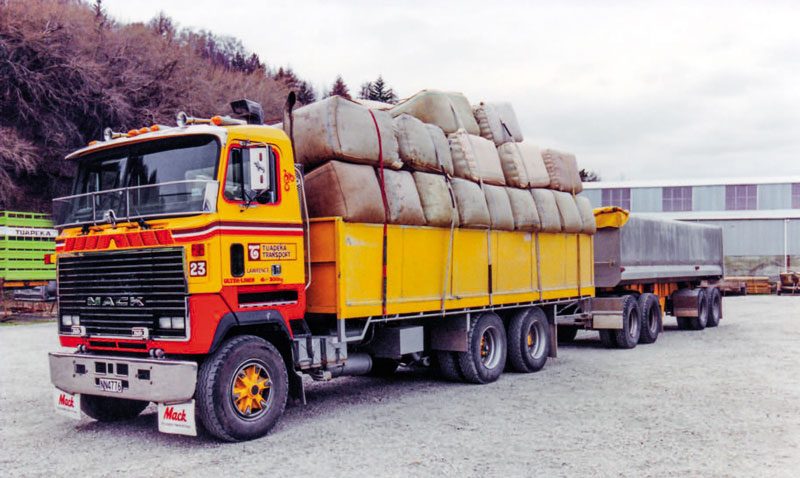
Tuapeka operated a freight run from Lawrence to Dunedin for a time, and because the Mack wasn’t the easiest thing in which to negotiate the streets of Dunedin, a J-series Bedford was used for the drop-offs.
The dawn of the Ultra-Liner
The first Ultra-Liner (MH model) was built in 1985 but only appeared in 1986, not long after the Cruise-Liner. Build No.838 was the start of many of these models. In fact, 18 joined the fleet, making it the country’s biggest fleet of MHs. Tuapeka continued to buy the Ultra-Liner until the model was discontinued in 1999. Most of them were 8x4s, with a couple of six- wheelers also – one was the rebuild of an 8×4 after an accident – as well as a tractor unit. They were spread right across the company’s operations – bottom dump, livestock, bulk, logs, and more.
A rural supply fleet story can’t be completed without reference to its fertiliser spreaders. When Somerville’s was taken over, its spreader fleet consisted of a Mercedes- Benz, a CW Nissan and a Ford County. Later on, an Agtruk also joined, ideal for the Lawrence’s hills.
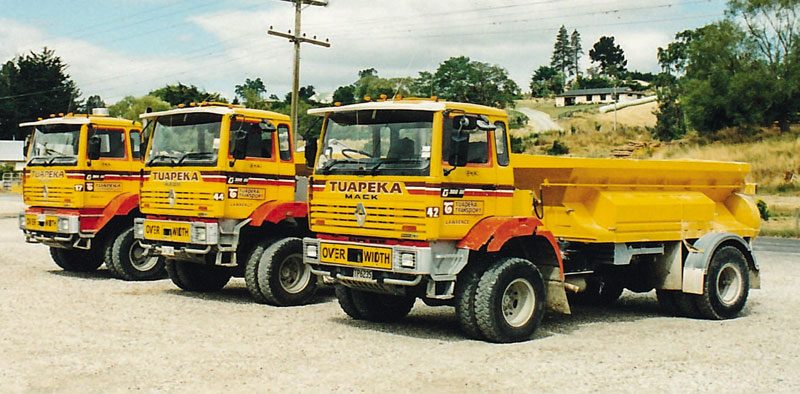
Judy recalls Nicol wandering inside one day with blood pouring out of his head.
“He was operating the Agtruck nearby to home, and I thought he had rolled the truck. He had merely hit his head on the ceiling when the truck hit a tomo.” Suspension wasn’t their strong point.
A 911 Mercedes-Benz came on board when they seemed all the rage and, staying with the Mack theme, they also bought Mack Maxter spreaders. Their MAN spreader, bought in 2003, was the last truck purchased under Nicol’s ownership.
Murray Sowerby on Nicol Kane
The Mack name and Tuapeka Transport go together like Gabriels Gully and gold. Former general manager at Motor Truck Distributors, Murray Sowerby, got to know Nicol and Gordon very well during his years at the company.
“Tuapeka were bloody important customers for us,” Murray says. Murray started at MTD in 1981 but didn’t begin dealing with Nicol until the late 1980s. When it came to buying trucks, he only dealt with Nicol.
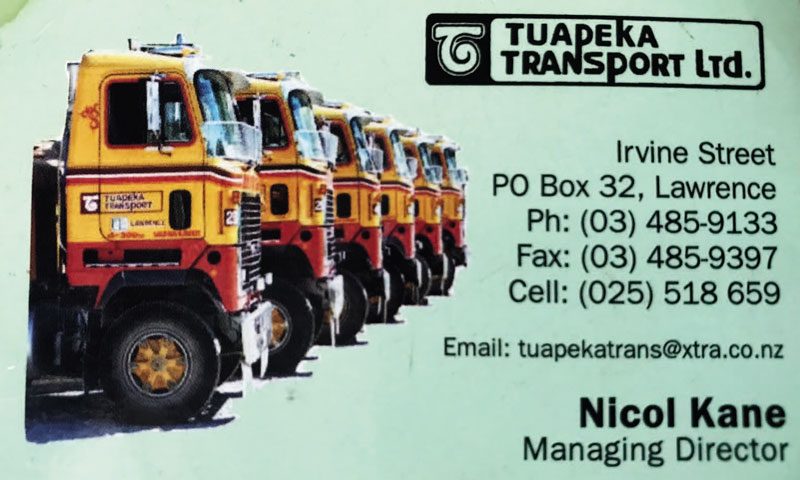
“Nicol bought the trucks and Gordon wrote the cheques. He was tough and not the easiest man to deal with. I would call in for a chat and we would go through the ailed parts. Everything that failed was, in Nicol’s mind, a warranty issue. This wasn’t always the case. Nicol and Gordon didn’t expect to be wined and dined by MTD. They just wanted reliable trucks and good backup. We would meet up in the Beaumont pub and Evan ‘Chau’ Williams, another Mack customer, at Clutha Valley Transport in nearby Clydevale, would come over as well.”
Nicol had high praise for the backup provided by MTD. He would often mention to Murray about Pat O’Connor, who was the field service tech for Mack in Christchurch. Pat was there from the mid-1970s to the mid-1980s. Once, when one of the R-models did a camshaft somewhere in the Otago region, Pat drove down from Christchurch through the night to repair the Mack on the side of the road. This stuck with Nicol and helped cement the relationship with MTD.
With the end of the MH series, they continued with the brand and bought three of the new Quantum series, all rural service trucks. The Quantums were among the last trucks bought by Nicol.
Gordon Soper finished up with Tuapeka in about 2000 and, by 2003, the allure of running a transport business was fading for Nicol. Increasing regulation, the difficulties of getting good drivers, and his love of farming led to him selling up in 2003. Dynes bought the log-cartage side and the rural side went to West Otago Transport.
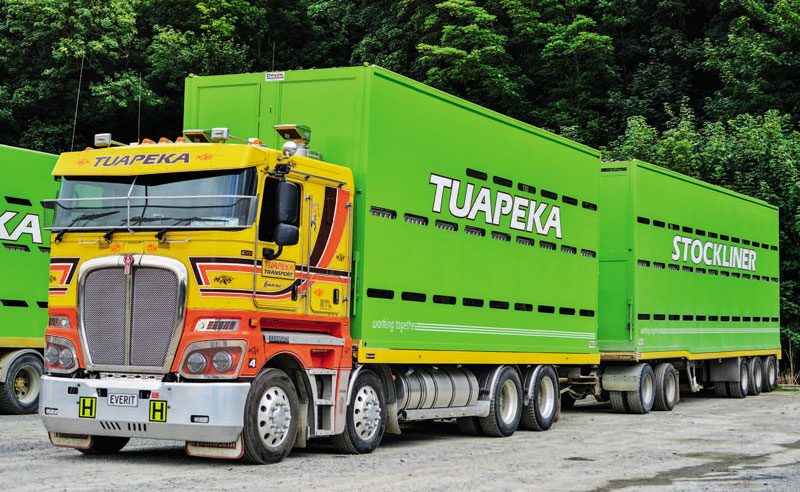
Nicol had purchased a farm in 1990, gradually growing it to about 810ha (about 2000 acres) and it is still with the Kane family today. The farm retains one Tuapeka Transport truck, an ex-Fulton Hogan Central Mack RB.
Hark-back to getting good drivers
Over the years, Tuapeka Transport had its fair share of ‘world-famous in the south’ drivers. Jock Clucas, Ian Beel, Dave Cavanagh, Ian (Pixie) McKenzie and Ray Stronach are a few that spring to mind. These legendary names made their living piloting some of the coolest trucks about; Macks that could blow other trucks away on the Kilmog carting livestock north, meeting the same trucks still getting to the works on their way back.
Quite a few Tuapeka drivers were originally driving for other companies and were constantly being overtaken by Tuapeka Macks. They would end up knocking on Nicol’s door, looking for work. At one stage, there were people queuing up looking for driving jobs with Tuapeka. The company had a reputation for good managers with impressive trucks.
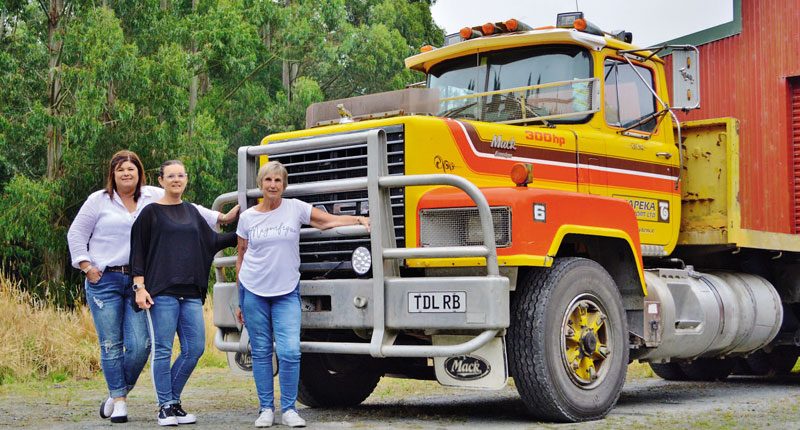
family farm today.
Nicol rated his Macks highly. They were relatively cheap to repair and Truckstops Dunedin (formerly Camerons) was also highly rated. Ken McDowall was the mechanic at Tuapeka Transport for several years and Nicol was a fan of his. Nicol said to Ken once, “Surround yourself with good people, and you’ll do all right.” Ken also added that “Nicol was a grumpy bugger at times.”
Nicol had a reputation for never turning away work – he always found a way, and the company never lost a client. Providing a great service was at the forefront of his way of thinking. Thankfully the Tuapeka Transport colours remain today and, it has to be said, the current owner, Road Transport Logistics, did a great thing by retaining the colours. You only have to see their K200 Kenworth on livestock in the famous livery. Will it ever beat the same colours on a yard full of Macks?
Can you imagine living in Lawrence through the mid- 1980s to the mid-1990s and hearing those Mack air-starts cranking up on a still winter’s morning, one after another?
Nicol’s last journey was on the back of his beloved replica 1987 Rugby World Cup Super-Liner, driven by his son-in-law, Stu Cotton. Nicol John Kane was laid to rest in the Lawrence Cemetery.





